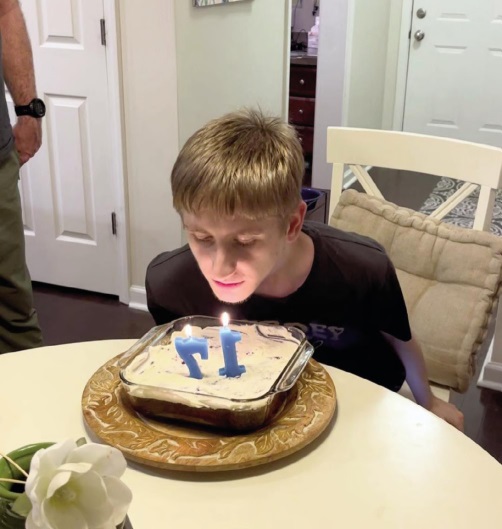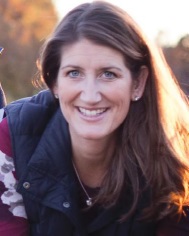PUZZLES & CAMO SHELLY HUHTANEN
Off the Cliff
Only parents with young adults with severe disabilities really understand the fear of having their child with severe disabilities reach adulthood. It's called "falling off the cliff."
"Sometimes you just have to jump off the cliff without knowing where you land." Zainab Salbi's quote spoke to me as we celebrated our son completing one more journey around the sun. We kept the celebration small and intimate, just how Broden likes it. We sang "Happy Birthday" to him while my parents celebrated with us through FaceTime on my phone. After Broden licked some frosting off the candles and had about three bites of his cake, he asked to head upstairs to be alone. Mark and I said goodbye to my parents and we gathered up the plates, cleaned up the table and hugged each other. Only parents with young adults with severe disabilities really understand the fear of having their child with severe disabilities reach adulthood. It's called "falling off the cliff." This term means that once an adult reaches a certain age, they no longer qualify for services. It's almost like our society erases them from existence, but in fact they are still here, and their parents are the ones who bear the brunt of filling in gaps that services no longer fill.
A friend of mine who has a child with severe autism just celebrated his 22nd birthday. I saw her about a week ago and told her that Broden had just turned 17 years old. Her response was different than other friends of mine who have typical children. “Congratulations!” She then turned around with a solemn look, “He’s getting closer to falling off the cliff. It’s scary, isn’t it?” All I could do is nod in agreement. No one understands the fear until they are experiencing it. The analogy in itself speaks volumes, and I couldn’t find a better one to describe the experi-
-ence. For your child's entire life there has been some sort of path. There are educational services, IEP's, and although it is far from perfect, there is IDEA (Individual's with Disabilities Act). But when your child turns 22 years old, it all goes away. Services and support for adults with disabilities is slim at best, littered with long waiting lists. With little to no options, the ability to find quality support is a real concern.

CLIFFHANGER: When your child turns 22 years old, services and support for adults with disabilities is slim at best, littered with long waiting lists. With little to no options, the ability to find quality support is a real concern.
As I hugged Mark in the kitchen after Broden blew out his candles, I asked him, "What grade would Broden be in if he was typical?" Mark looked at me with a scowl. He doesn't like it when I play the "what if" game, because I can start down a rabbit hole of despair that takes me a
long time to crawl out of, at times. Mark took a deep sigh, “Broden would theoretically be a junior in high school.” I leaned my head on his chest, “He would be going to prom next month and we would be looking at colleges with him. He would most likely be studying for his SAT’s.” Mark didn’t respond.

Instead of taking Broden to a local boutique, Brittons, to get measured for a tux or scheduling him for a college tour this Spring, we are taking him to a law office, so we can start the legal process to gain legal guardianship of Broden and be able to make decisions on his behalf. We will be seeking legal support off post, because JAG (Judge Advocate General), does not provide this service. Basically, we will need to prove in a court of law, that our soon to be adult child with severe autism, is unable to make good clear decisions concerning his health and quality of life. We, his parents, should be the ones to continue to do so. This is a necessary step needed to care for Broden, but it’s a dark one. Seeking legal guardianship for Broden feels like we are starting to see the edge of the cliff draw closer, and as our eyes try to peak forward, there is no ground ahead as far as the eye can see. We can’t hit pause and slow down to take a breath. It’s happening.
We can’t look behind us for guidance, because the parents of younger children are still on the path of support and services.